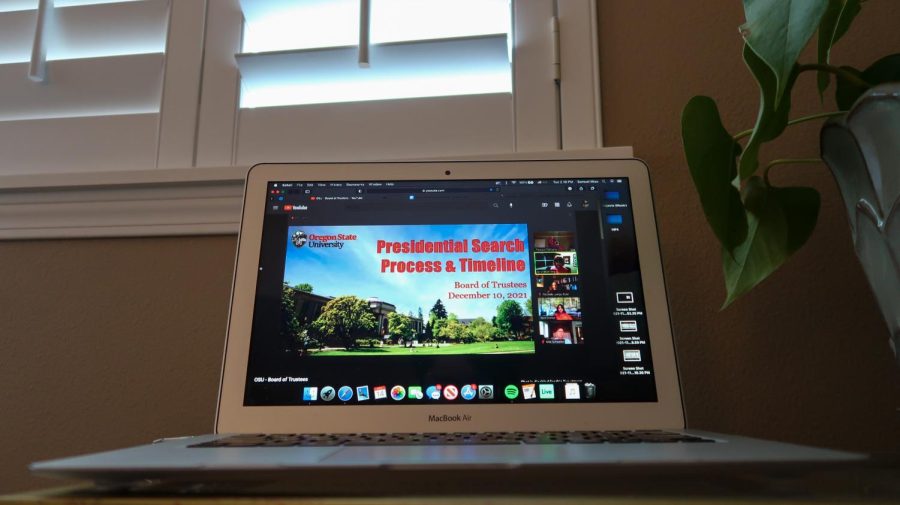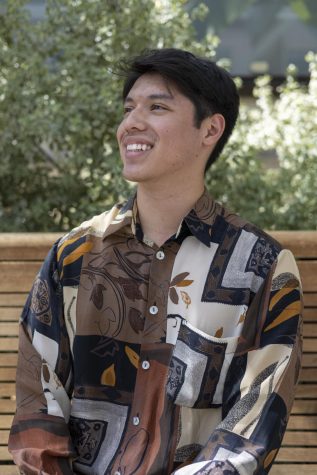Oregon State University presidential search listening sessions ‘are a good start’
During a Board of Trustees meeting held in the Memorial Union on Oregon State University’s Corvallis, Ore. campus on Dec. 10, the board discussed the new presidential search timeline. The live listening sessions, which occurred between Jan. 12 and Jan. 20, were part of the early steps in the presidential search process.
January 21, 2022
Listening sessions at Oregon State University marked the first opportunity for members of the community to give feedback and raise questions and concerns about the presidential search.
These live listening sessions, which occurred via Zoom on five different days in January, were held by the OSU Presidential Search Advisory Committee to gather input on the desired qualities and characteristics of the next president, as well as some of the challenges this new president may face.
“I think another challenge that the next president is going to have to deal with is the rise in extremism as Oregon diversifies and as OSU continually diversifies, we’re seeing a rise in right-wing, racially-based extremism that definitely impacts our underrepresented students,” said Dawn Marie Alapisco, coordinator of the Office of Institutional Diversity’s Native American Graves Protection and Repatriation Act, during one of the listening sessions on Jan. 19.
Alapisco said students had told her they were afraid to admit they were part of a certain identity because they were scared others could use their identity to further marginalize them.“I am trusting that the Board of Trustees has OSU’s best interests in mind, and I am one out of many,” Alapisco said. “So, while I have specific desires in a president, I can’t say that my desires supersede the masses. My hope and my trust is that the Board of Trustees heard the faculty and the students and everyone else after the last situation and realize that this needs to be a much more transparent process… And the listening sessions are a good start.”
Amy Fraser, health equity director for Student Health Services, also raised concern about dealing with interpersonal violence and its prevention on the OSU campus.
Fraser said she wants potential candidates to be asked about their thoughts, experiences and curiosities about not only reporting interpersonal violence but preventing it as well.
“Response, survivor advocacy, I think those sometimes get missed in higher education,” Fraser said. “We’re often having conversations about sort of planning and reporting, and the logistics of situations or scenarios, but maybe [not] efforts that we’re placing on the culture of our campus.”
Community members were also able to submit feedback to the Advisory Board via a survey that closed on Jan. 20. Alapisco was one member of the community who completed this survey.
“What I’m looking forward to is having an honest, ethical, transparent and adaptable president who, if they make a mistake, they sincerely apologize and learn from it,” Alapisco said. “If something happens here at OSU that means we need to change, they push forward on that change and don’t let just political wrangling stop them from doing what’s right.”
According to a press release from OSU News and Research Communications, input gathered from the listening sessions and the survey will determine the presidential leadership profile.
“[This] will serve as the basis by which the Presidential Search Advisory Committee and executive search firm recruits and identifies potential candidates,” the press release stated.
Steve Clark, vice president of University Relations and Marketing, said OSU is more than a school; it is a community made up of not only students but also faculty, staff, alumni and stakeholders throughout Oregon. The university, according to Clark, takes input provided by the community very seriously.
“The board is the group of people that will analyze that input and make decisions on what are the prior priority qualifications,” Clark said. “And considerations for the next president will help shape and guide how the university addresses priority needs, strategies and opportunities.”











































































































